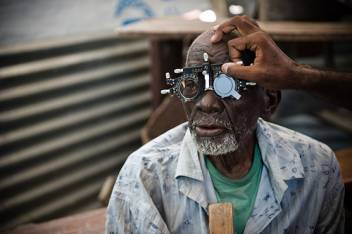 This week in a cold grey Brussels, the European Commission (EC) launched its long-awaited communication on the post-2015 framework. This communication will help frame the European Union (EU) debate on this process in coming months and will contribute to the formulation of a common EU position ahead of the UN Special Event on post-2015 in September 2013.
This week in a cold grey Brussels, the European Commission (EC) launched its long-awaited communication on the post-2015 framework. This communication will help frame the European Union (EU) debate on this process in coming months and will contribute to the formulation of a common EU position ahead of the UN Special Event on post-2015 in September 2013.
“A decent life for all”
The communication “A decent life for all: ending poverty and giving the world a sustainable future” proposes a single over-arching framework uniting two key EU objectives of poverty eradication and sustainable development.
This innovative approach efficiently integrating the Sustainable Development Goals (SDGs) and Post-Millennium Development Goals (MDGs) has been welcomed by many stakeholders. The communication is less concrete, however, on human rights and commitments to financing and accountability.
Building on lessons from the MDGs
The MDGs successfully mobilised the international community to address some very important development challenges and had a huge influence on the development initiatives of the EU, the world’s biggest aid donor.
However, the narrowly targeted nature of the goals and their emphasis on children and maternal health led to some sections of the population, such as older people, remaining largely invisible in EU development policy and programmes. Population growth still tends to be the dominant theme of demographic change discussions with other dramatic trends such as ageing often being overlooked.
It is therefore a very important development that in the context of future global trends, the EU’s communication refers not only to projected population growth, but also to the fact that the world’s population is ageing. It underlines the fact that the impact of ageing will be felt most in developing countries, in terms of health services, pensions and tax revenues.
These were some of the topics discussed at the European Parliament in October 2012 at an event organised by the HelpAge network. This communication opens up the door for more detailed and concrete debate on these issues in EU development policy.
Another positive feature running throughout the communication is the strong emphasis it places on the critical role that social protection plays in tackling poverty and inequalities. It recognises that currently 80% of the world’s population do not have access to adequate social protection. It also firmly states the EU’s support for ensuring coherence with existing international agreements on the implementation of national social protection floors.
The need for a life-course approach
The communication highlights other important issues such as youth unemployment, female participation in the labour market and small-scale farming or self-employment. However, it fails to recognise the important links between these issues and the ageing of populations.
Older people’s economic activity, especially in small-holder agriculture is essential to food security and sustainable agriculture and the role that older people play in shaping the capabilities of younger generations cannot be overestimated. As family structures shift as a result of population dynamics, older people are increasingly taking on caring responsibilities for children and young people.
A life-course approach to development can help break the intergenerational cycle of poverty and exclusion. This approach means ensuring that people of all ages have their right to social protection realised and the right to decent work for all, including for older people who can and choose to work, is also protected.
Ageing is an immediate demographic reality
In the post-2015 debate over coming months, the EU must take an inclusive life-course approach changing the way that older people are viewed and recognising the potential they have to contribute to development.
Ageing must be viewed not only as a long-term trend resulting in future fiscal pressures, but as an immediate demographic reality presenting opportunities as well as challenges.
This week the EU reaffirmed its commitment to play a key role in the global post-2015 debate and related processes. It plans to actively seek further constructive discussions with all partners and stakeholders.
The HelpAge network and our partners must continue to work together to ensure that the voices of older people are heard in this process.
Read more about what we’re doing to engage with the post-2015 process and the post-2015 High-Level Panel.
